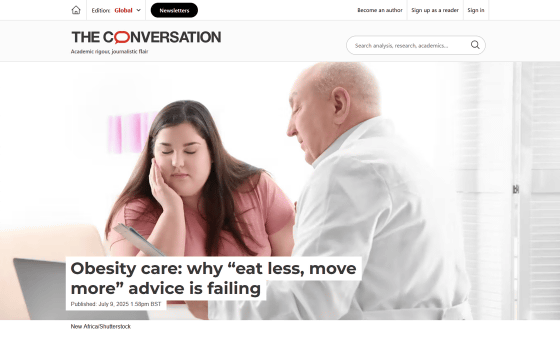Why does advising obese people to 'eat less and exercise more' fail? How should we address the obesity crisis?

The most common advice given to obese people is to 'eat less and exercise more,' but for many people this advice is not only ineffective but may even be harmful, according to
Obesity care: why “eat less, move more” advice is failing
https://theconversation.com/obesity-care-why-eat-less-move-more-advice-is-failing-254628

Neild et al. point out: 'Obesity is not just a willpower issue. It is a complex, chronic, relapsing disease that affects around 26.5% of adults and 22.1% of children in England.'
Obesity costs the UK population £126 billion a year, with £71.4 billion in lost quality of life and premature death, £12.6 billion in treatment costs to the NHS, £12.1 billion in lost work, and £10.5 billion in informal treatment.
Food activists and health experts want a sugar tax to be expanded to cover a wider range of products such as soft drinks, restrictions on junk food advertising and mandatory changes to the ingredients of industrially produced , ultra-processed foods .
'We have created a food system that is harming people and bankrupting the nation,' said Henry Dimbleby, author of the National Food Strategy, an independent report commissioned by the government.
Unless the government makes fundamental policy changes, the cost of obesity in the UK as a whole is predicted to reach £150 billion (about 22.1 trillion yen) per year by 2035. Despite this, many of the UK's policies continue to emphasize individual responsibility for obesity and ignore the bigger picture.

Recent research has shown that obesity
Nield and his colleagues point out that the environment in which modern people, especially those living in developed countries, live is an 'obesogenic environment' -- a world in which high-calorie, low-nutrient foods are widely available and cheap, and where physical activity is eliminated from everyday life, from car-driven cities to screen-dominated leisure time.
These circumstances do not affect everyone equally. People living in disadvantaged areas are exposed to conditions that promote obesity, such as limited access to cheap, nutritious food, difficulty reaching distant shops by public transport, and fewer green spaces for exercise. 'In these circumstances, weight gain is a normal biological response to an abnormal environment,' Neild and his colleagues argued.
While there is growing awareness that obesity has these systemic causes, many obesity countermeasures in the UK still focus on individual behavior change. Although calorie restriction and regular exercise are certainly important for weight loss, focusing solely on this spreads the dangerous discourse that 'obesity is due to a lack of individual effort' and reinforces social stigma.

Neild et al. list the following four points as appropriate measures to combat obesity:
◆1: Recognize that obesity is a chronic disease
Rather than becoming obese because of a lack of willpower, it is important to recognise that obesity is a relapsing disease that, like diabetes or depression, requires systematic and ongoing support rather than being treated with short-term solutions or crash diets.
2. Addressing weight bias
Weight-based discrimination is widespread in schools, workplaces and even medical settings, and Nield and colleagues say, 'We need professional training to reduce prejudice, promote comprehensive care and use person-centered, non-prejudiced language.'
◆3: Provide individualized, multifaceted support
Because the causes of obesity are multifactorial, treatment plans should be tailored to the cultural, psychological and social context of each patient's life, including shared decision-making between health care providers and patients, regular follow-up and comprehensive mental health support.
4. Focus on environmental change, not people
Because whether someone becomes obese is largely a function of their environment, efforts to combat obesity need to target the systems and structures that make it difficult to make healthy choices, 'which means investing in affordable, nutritious foods, improving access to physical activity, and addressing underlying inequalities,' Neild and his colleagues argue.

Related Posts:
in Science, Posted by log1h_ik







